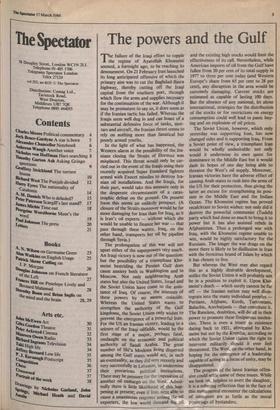The powers and the Gulf
he failure of the Iraqi effort to topple the regime of Ayatollah Khomeini seemed, a fortnight ago, to be reaching its denouement. On 21 February Iran launched its long anticipated offensive of which the primary aim was to cut the Baghdad-Basra highway, thereby cutting off the Iraqi capital from the southern port, through which flow the arms and supplies necessary for the continuation of the war. Although it may be premature to say so, it does seem as if the Iranian tactic has failed. Whereas the Iraqis seem well dug in and can boast of a substantial defensive force of tanks, mor- tars and aircraft, the Iranian thrust seems to rely on nothing more than fanatical but poorly armed youths.
In the light of what has happened, the Western alarm at the possibility of the Ira- nians closing the Straits of Hormuz was misplaced. This threat would only be car- ried out in the event of the Iraqis using their recently acquired Super Etendard fighters armed with Exocet missiles to destroy Ira- nian oil installations. And the Iraqis, for their part, would take this measure only in the desperate circumstances of a catas- trophic defeat on the ground. On present form this seems an unlikely prospect. (A closure of the Straits moreover would be far more damaging for Iran than for Iraq, as it is Iran's oil exports — without which she would be unable to finance her war — that pass through these waters. Iraq, on the other hand, transports her oil by pipeline through Syria.) The prolongation of this war will not upset either of the superpowers very much. An Iraqi victory is now out of the question: but the possibility of a triumphant Kho- meini bestriding the Persian Gulf does cause anxiety both in Washington and in Moscow. Not only neighbouring Arab states but also the United States, Israel and the Soviet Union have come to the assis- tance of Iraq. Of course, the interests of these powers by no means coincide. Whereas the United States wants to strengthen the authority of the Gulf kingdoms, the Soviet Union only wishes to prevent the emergence of a powerful Iran. For the US an Iranian victory, leading to a seizure of the Iraqi oilfields, would be the first stage of a major, perhaps fatal, onslaught on the economic and political authority of Saudi Arabia. The great number of Shi'a Moslems living dispersed among the Gulf states would act, in such
an eventuality, as they recently and very successfully in Le;oioo--.o undermine their precarious pcioical institutions. There may be pressure to-r- the t nposition of another oil embargo e:: the West. Admit- tedly there is little likelihood of this hap- pening at present; even if Iran were able to cause a unanimous resperts.: among the oil exporters, the low world demand Bra oil
and the existing high stocks would limit the effectiveness of its call. Nevertheless, while American imports of oil from the Gulf have fallen from 20 per cent of its total supply in 1977 to three per cent today (and Western Europe's share from 65 per cent to 28 per cent). any disruption in the area would be extremely damaging. Current stocks are estimated as capable of lasting 100 days.
But the absence of any national, let alone international, Aratezies for the distribution of the stocks or for restrictions on energy consumption could well lead to panic buy- ing and an explosion of oil prices.
The Soviet Union, however, which only- yesterday was supporting Iran, has now changed sides and is supporting Iraq. From a Soviet point of view, a triumphant Iran would be wholly undesirable: not only would it undermine its own quest for dominance in the Middle East but it would dash its hopes of one day being able to threaten the West's oil supply. Moreover, Iranian victories have the adverse effect of causing Arab states to rush into the arms of the US for their protection, thus giving the Latter an excuse for strengthening its posi- tion in the Middle East and the Indian Ocean. The Khomeini regime has proved recalcitrant to Soviet wishes: not only did it destroy the powerful communist (Tudeh) party which had done so much to bring it to power but it has also assisted rebels in Afghanistan. Thus a prolonged war with Iraq, with the Khomeini regime unable to win, would be highly satisfactory for the Russians. The longer the war drags on the more there is likely to be disillusion in Iran with the ferocious brand of Islam by which it has chosen to live.
But whereas the West may also regard this as a highly desirable development, unlike the Soviet Union it will probably not be in a position to exploit it. Upon Kho- meini's death — which surely cannot be far off — the Iranian nation may well disin- tegrate into the many individual peoples — Persians, Afghans, Kurds, Turcomans, Baluchis, Azerbaijanis — that constitute it. The Russians, doubtless, will do all in their power to promote these fissiparous tenden- cies. There is even a treaty in existence dating back to 1921, abrogated by Kho- meini but not by the Kremlin, according to which the Soviet Union claims the right to intervene militarily should it ever feel threatened. The West, an the other hand, in hoping for the emergence of a leadership capable of acting as a focus of unity, may be disappoin ted.
The progress of the latest Iranian offen- sive could settie some of these issues. While we look on, helpless to avert the slaughter, it is a sobering reflection that in the face of this monumental encounter the calculations of statesmen are as futile as the moral posturings of bystanders.














































 Previous page
Previous page